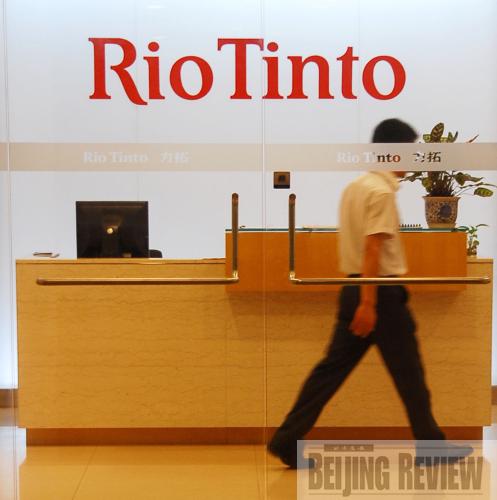|
 |
|
BEING INVOLVED: Iron ore giant Rio Tinto's Shanghai staff were detained on charges of espionage (NIU YIXIN) |
Four employees of Rio Tinto, including Hu Shitai, former head of Rio's Shanghai office and Rio's China iron ore division, were detained in Shanghai on July 5, on charges of espionage. A senior executive of China's major steel maker Shougang Group, Tan Yixin, head of the group's iron ore trading company, was arrested in Beijing on July 7 for suspected commercial crimes.
During iron ore negotiations this year, Hu allegedly stole state secrets via illegal means including bribing staff of Chinese steel companies, imposing serious damages to China's national economic security and interests, according to a statement made by the Shanghai State Security Bureau.
In accordance with the Chinese jurisdiction system, the direct involvement of the state security department in the investigation indicates that the Rio Tinto case is not simply an ordinary commercial bribery or commercial secret case, but a criminal case involving state secrets.
Since the case, referred to as "Rio Tinto espionage gate" in China, is still in the investigation stage, it is uncertain how many people are involved. Industrial insiders say that among the 16 Chinese steel mills participating in the iron ore negotiation, many company leaders have been implicated in the case.
Behind deals
China has participated in international iron ore negotiations with Australia's BHP Billiton Ltd. and Rio Tinto, as well as Brazil's Companhia Vale do Rio Doce (CVRD) since 2003. The yearly negotiations fix the prices of iron ore for the year to come. The latest negotiation over iron ore, in its seventh year, was held from November 2008 and was scheduled to conclude by June 30, 2009. The negotiation are ongoing.
The results from the past six years have been less than favorable, as China's steel makers experience failures in the negotiation process as prices for iron increased heavily. Negotiations, completed when iron ore prices reached their highest on the international market, were made on the prices proposed by iron ore suppliers.
After six years, the prices of iron ore sold by the three international corporations to China soared 400 percent. As the world's largest iron ore buyer, China has no say in any negotiated prices. Equally disturbing are the saboteurs from within Chinese iron and steel companies who provide intelligence to the competitors. Reports claim that Rio Tinto has a substantial number of eyes and ears in China. On computers confiscated by relevant departments in Rio Tinto's Shanghai office, secret information was found on dozens of Chinese steel mills that have signed long-term contracts with the iron ore corporation, according to Xinhua News Agency. The information was related to procurement plans, raw material inventories and production data in detail, in addition to clearly displayed monthly output and sales volumes of some large-scale steel makers.
Business is business
The annual iron ore negotiation is a prominent event in China's economic landscape. This year's negotiation is drawing more attention than before due to an unprecedented deadlock caused by the two parties requiring different price cuts on iron ore. Owing to the huge impact of the international financial crisis, the Chinese side hopes for a 40-percent cut from the 2008 price, while international iron ore suppliers, such as Rio Tinto, insist on a 33-percent cut.
Another obstacle to the negotiation is the involvement of Rio Tinto representatives in the "espionage gate."
Spokesman of the Ministry of Commerce (MOFCOM) Yao Jian, responding to the "espionage gate" of Rio Tinto, on July 15 said the iron ore negotiation is still in progress. The MOFCOM will continue to support the industrial associations and suppliers of iron ore in the upcoming negotiations in order to maintain China's ability to gain reasonable prices and comply with the country's agreement to trade with large nations during the iron ore talks with Australia, Yao said.
For Chinese steel mills, it is currently impossible to give up the long-term contracts with Australian iron ore suppliers and transfer to the spot trading market. The iron ore negotiation pattern has taken many years to form and remains a stable channel of communication. The negotiation pattern will most likely continue in the coming years, Yao said.
The Rio Tinto case won't influence the cooperation between foreign and Chinese enterprises, said Qin Gang, spokesman of China's Ministry of Foreign Affairs. Lawful actions have been taken by the appropriate authorities against employees implicated at Rio Tinto for stealing state secrets and gravely impairing China's economic security and interests. "However, this does not mean that we are going to restrict foreign business in China or the cooperation between foreign and Chinese enterprises," Qin said.
| 